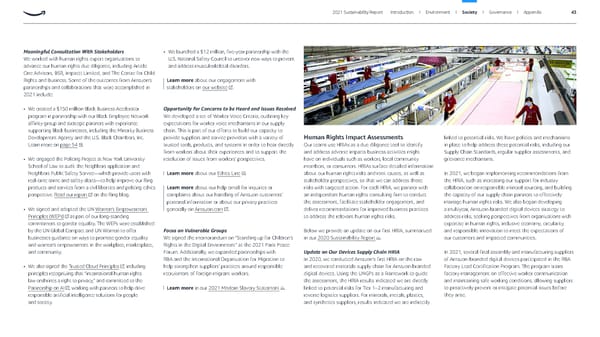Meaningful Consultation With Stakeholders We worked with human rights expert organizations to advance our human rights due diligence, including Article One Advisors, BSR, Impactt Limited, and The Centre for Child Rights and Business. Some of the outcomes from Amazon’s partnerships and collaborations that were accomplished in 2021 include: • We created a $150 million Black Business Accelerator program in partnership with our Black Employee Network affinity group and strategic partners with experience supporting Black businesses, including the Minority Business Development Agency and the U.S. Black Chambers, Inc. Learn more on page 54 . • We engaged the Policing Project at New York University School of Law to audit the Neighbors application and Neighbors Public Safety Service—which provide users with real-time crime and safety alerts—to help improve our Ring products and services from a civil liberties and policing ethics perspective. Read our report on the Ring blog. • We signed and adopted the UN Women’s Empowerment Principles (WEPs) as part of our long-standing commitment to gender equality. The WEPs were established by the UN Global Compact and UN Women to offer businesses guidance on ways to promote gender equality and women’s empowerment in the workplace, marketplace, and community. • We also signed the Trusted Cloud Principles , including principles recognizing that “international human rights law enshrines a right to privacy,” and committed to the Partnership on AI , working with partners to help drive responsible artificial intelligence solutions for people and society. • We launched a $12 million, five-year partnership with the U.S. National Safety Council to uncover new ways to prevent and address musculoskeletal disorders. Opportunity for Concerns to be Heard and Issues Resolved We developed a set of Worker Voice Criteria, outlining key expectations for worker voice mechanisms in our supply chain. This is part of our efforts to build our capacity to provide suppliers and service providers with a variety of trusted tools, products, and systems in order to hear directly from workers about their experiences and to support the resolution of issues from workers’ perspectives. Focus on Vulnerable Groups We signed the memorandum on “Standing up for Children’s Rights in the Digital Environment” at the 2021 Paris Peace Forum. Additionally, we expanded partnerships with RBA and the International Organization for Migration to help strengthen suppliers’ practices around responsible recruitment of foreign migrant workers. Learn more about our engagement with stakeholders on our website . Learn more about our Ethics Line . Learn more about our help email for inquiries or complaints about our handling of Amazon customers’ personal information or about our privacy practices generally on Amazon.com . Learn more in our 2021 Modern Slavery Statement . Human Rights Impact Assessments Our teams use HRIAs as a due diligence tool to identify and address adverse impacts business activities might have on individuals such as workers, local community members, or consumers. HRIAs surface detailed information about our human rights risks and root causes, as well as stakeholder perspectives, so that we can address those risks with targeted action. For each HRIA, we partner with an independent human rights consulting firm to conduct the assessment, facilitate stakeholder engagement, and deliver recommendations for improved business practices to address the relevant human rights risks. Below we provide an update on our first HRIA, summarized in our 2020 Sustainability Report . Update on Our Devices Supply Chain HRIA In 2020, we conducted Amazon’s first HRIA on the raw and recovered materials supply chain for Amazon-branded digital devices. Using the UNGPs as a framework to guide the assessment, the HRIA results indicated we are directly linked to potential risks for Tier 1–2 manufacturing and reverse logistics suppliers. For minerals, metals, plastics, and synthetics suppliers, results indicated we are indirectly linked to potential risks. We have policies and mechanisms in place to help address these potential risks, including our Supply Chain Standards, regular supplier assessments, and grievance mechanisms. In 2021, we began implementing recommendations from the HRIA, such as increasing our support for industry collaboration on responsible mineral sourcing, and building the capacity of our supply chain partners to effectively manage human rights risks. We also began developing a multiyear, Amazon-branded digital devices strategy to address risks, seeking perspectives from organizations with expertise in human rights, inclusive economy, circularity, and responsible innovation to meet the expectations of our customers and impacted communities. In 2021, several final assembly and manufacturing suppliers of Amazon-branded digital devices participated in the RBA Factory Lead Certification Program. The program trains factory management on effective worker communication and maintaining safe working conditions, allowing suppliers to proactively prevent or mitigate potential issues before they arise. 2021 Sustainability Report Introduction I Environment I Society I Governance I Appendix 43
 ESG Report | Amazon Page 42 Page 44
ESG Report | Amazon Page 42 Page 44